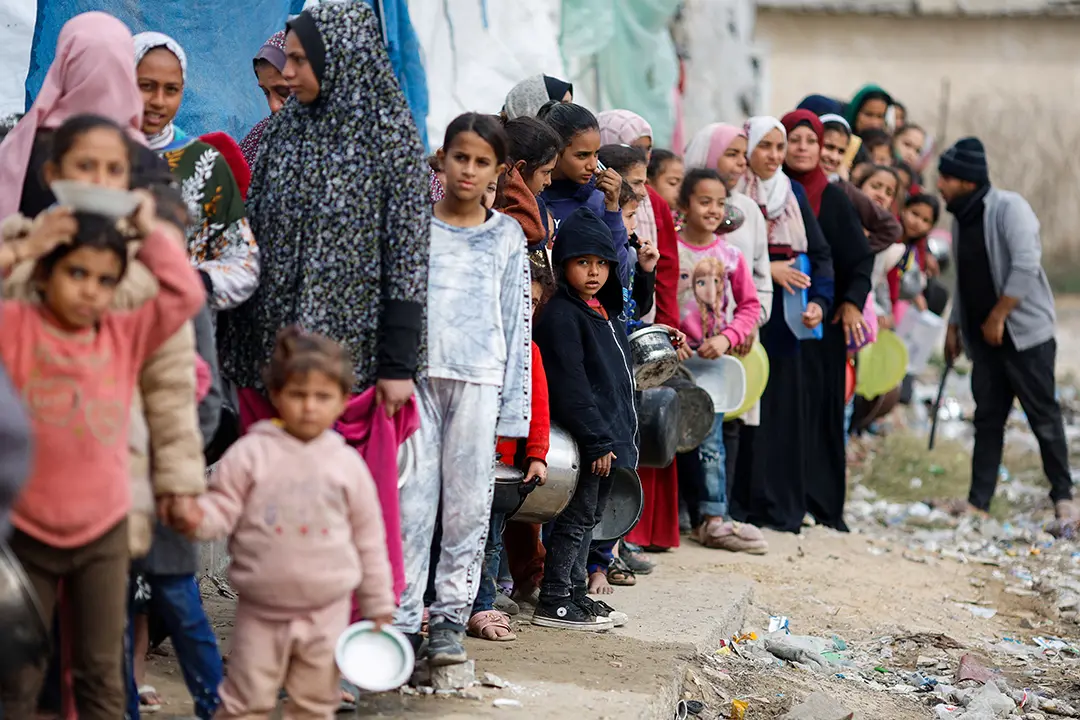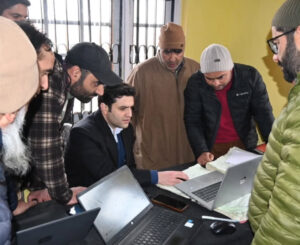New Dimensions of Gaza Humanitarian Activism

Palestinians wait in line to receive food in Rafah in the southern Gaza Strip. Mohammed Salem/Reuters
Opinion By| Farooq Ahmad Lone
The voyage of the boat Madleen, carrying humanitarian aid to Gaza, has reignited global attention on the power of civil resistance against state-imposed blockades. On June 1, twelve international activists, including prominent Swiss climate advocate Greta Thunberg, set sail aboard the vessel Madleen, named after Gaza’s only female fisherwoman, Madleen Kulab. Loaded with essential supplies such as rice, flour, and medicines, the boat aimed to reach Gaza by sea and express solidarity with the besieged Palestinian population. The mission, initiated under the Freedom Flotilla Coalition, received global support and media coverage. However, on June 9, the Israeli Navy intercepted the vessel and diverted it to Ashdod port, detaining the activists on board. Following international pressure and widespread condemnation from humanitarian organizations, the activists were confirmed to be unharmed, given medical checkups, and deported to their respective countries. Though Madleen did not reach Gaza, the symbolic voyage made a strong statement about the role of non-state actors in challenging state actions during humanitarian crises.
The Madleen mission evokes memories of the 2010 Mavi Marmara incident, another bold attempt to break the Gaza blockade. That earlier voyage, led by Turkish activists, ended in tragedy when Israeli commandos raided the ship and clashed with passengers, resulting in the deaths of ten Turkish nationals. The violent incident sparked widespread outrage and led to a major diplomatic rift between Turkey and Israel, with both countries briefly activating their air forces. Eventually, Israel’s then Prime Minister apologized in a phone call to Turkish leader Recep Tayyip Erdoğan. While Madleen avoided violence, its interception still highlighted the continuing tension between humanitarian activism and state security policies. The Freedom Flotilla Coalition once again demanded the safe release of activists, underscoring the enduring resolve of civil society to resist what many consider an illegal and inhumane blockade.
These recurring efforts to defy the Gaza blockade suggest a growing humanitarian movement operating outside traditional state frameworks. In recent months, as the Israel-Hamas conflict escalates, groups of activists from around the world have gathered at Egypt’s border with Gaza, pressuring authorities to allow aid and access to the war-stricken region. Though Egypt has largely denied such entry, the presence of international activists points to a broader moral and humanitarian impulse gaining strength. Analysts argue that unless the blockade is eased, larger non-state or even state-backed humanitarian interventions may emerge, with countries like Turkey potentially taking a more active role, as in 2010. As civil society continues to mobilize, Israel faces increasing scrutiny over its blockade policy, and its future responses may shape both the humanitarian and geopolitical contours of the Gaza crisis.
Author: Farooq Ahmad Lone can be reached at lonefarooqahmad80@gmail.com.





